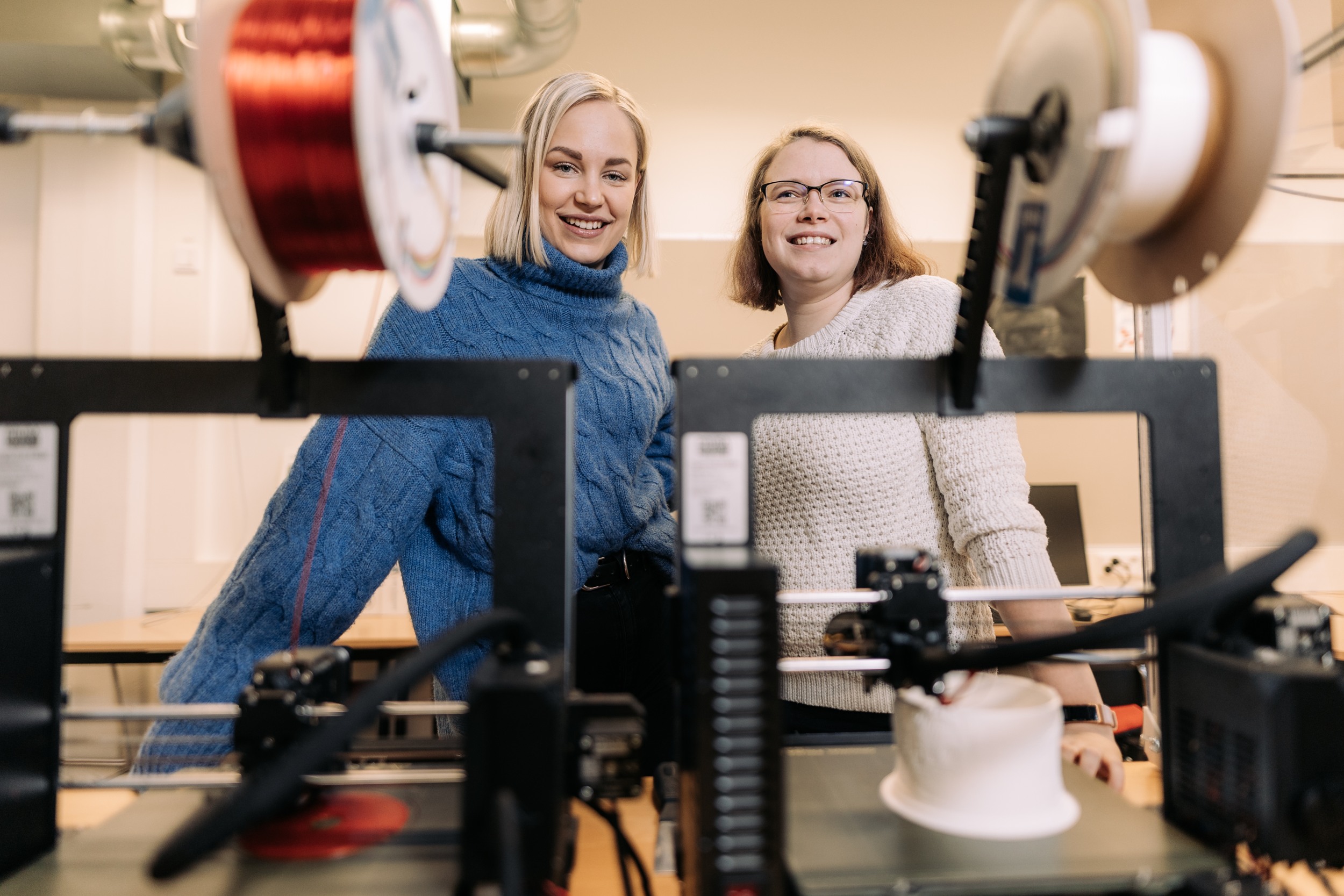
Profiling and Optional Studies
By profiling your competence, you build expertise in the chosen areas of professional skills, shaping your degree and competence according to your own goals.
Optional studies provide an opportunity to broaden, deepen, and complement professional skills and personal development according to your own goals.
What can I study?
The amount of profiling competence depends on the degree you are pursuing. It can be built from optional modules in the education, profiling studies from other educations, or other applicable profiling competencies.
You can select optional studies for your Personal Learning Plan (PLP) from your group’s study offering, from the studies of another education or group, or from HAMK’s common offering, which is explained in more detail on this page. In addition to the mentioned options, you can take elective studies from other universities, Open UAS, and as personal studies through various projects, such as cooperation with companies or learning environments.
Always ensure the suitability of the studies for your PLP before registering. Remember that you cannot include Master-level studies in your bachelor’s degree.
HAMK’s common course provision
You can find HAMK’s course selection in the Study Guide.
The implementation plans for common study offerings can be found in the optional courses search. You can also search for suitable implementations for profiling and optional studies in the course selection search by selecting HAMK’s Internal Cross-Study as the classification.
You can search for optional studies based on the field of study or language of instruction, and organize search results by clicking on the column header. You can also search for courses using the course search by applying your desired search criteria.
Unique study options in HAMK

Entrepreneurial university
Entrepreneurship is about recognizing opportunities, innovation capability, and the ability to create something new. In an entrepreneurial university, learning happens through collaboration and experimentation!
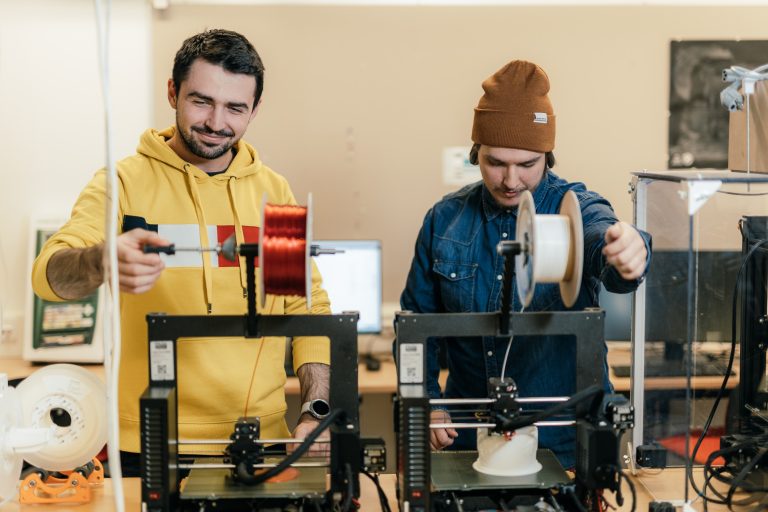
Design Factory
Design Factory is an operational and learning environment that brings together businesses, students, teachers, and researchers. Join projects where you develop new solutions together with students from various fields!
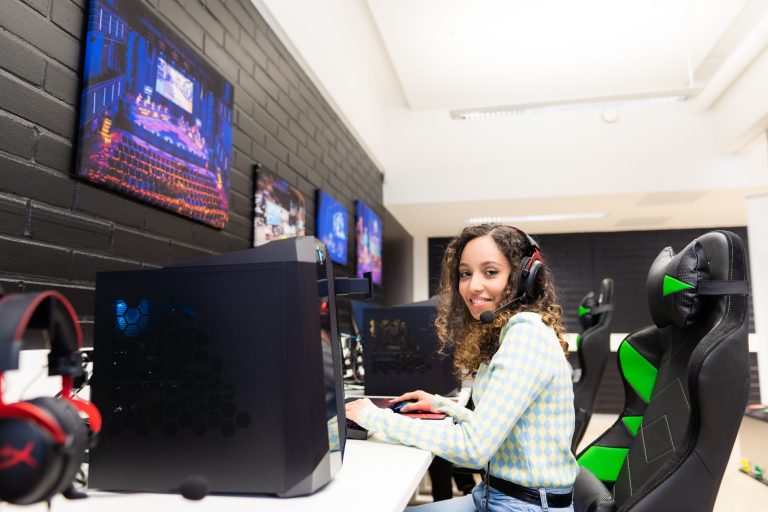
HAMK Gaming Academy
Study and explore e-sports and its business! In the Gaming Lab game rooms on campuses, you can combine work and play, as they can be used for studying or playing with fellow students
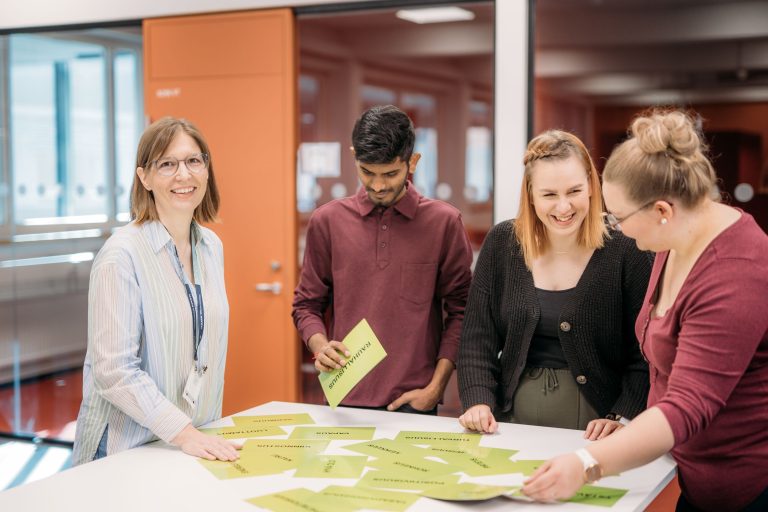
RUN-EU studies
HAMK is part of the RUN European University, comprised of nine European universities. You can leverage the fantastic opportunities provided by RUN European University for accumulating international study experiences!

Exchange Studies
Exchange studies are a unique opportunity to explore the world. We encourage all our students to seize the chance and go abroad for an exchange. Will you go too?
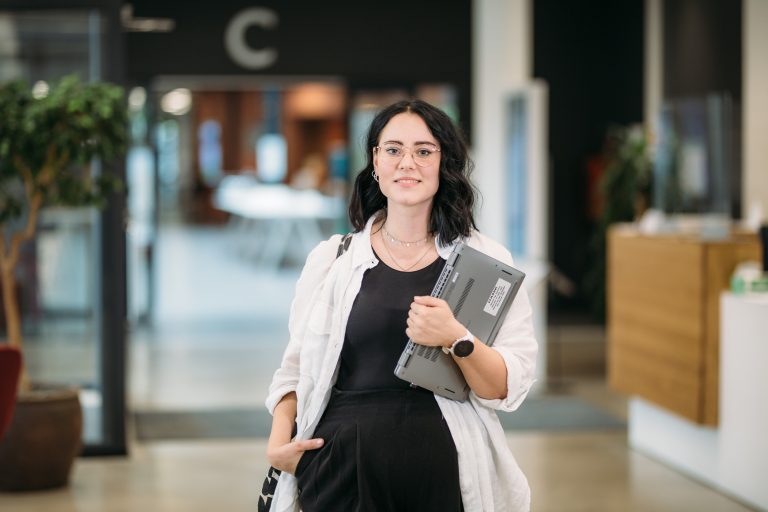
Cross-Institutional Studies
As a student at HAMK, you have the opportunity to take courses at other universities as well! It’s called cross-institutional studying, aiming to allow you to study comprehensive units that support your own goals.
More options:
You can receive credits for Scouting education towards your HAMK UAS degree by providing the official credit-transferred certificate from Scouting and a portfolio describing your competence in relation to the learning objectives. Your Scouting competence will be recorded for the “Guidance and Leadership in Voluntary Work” course. The table shows which Scouting courses and how many credits can be obtained, with a maximum of 15 cr, equivalent to the Developing Expertise module
| Scouts Course | NQF-levet and Scouts level | CR-Scouts | HAMK CR maximum |
| Partiojohtajan peruskoulutus | NQF 4, perustaso | 7 op | 3 op |
| Partiokouluttaja -koulutus | NQF 5, jatkotaso | 2 op | 2 op |
| Partiojohtaja -jatkokoulutus | NQF 5, jatkotaso | 25 op | 15 op |
| Koulutusohjaaja -koulutus | NQF 5, syventävä taso | 3 op | 2 op |
| Valmentaja –koulutus | NQF 5, syventävä taso | 2 op | 2 op |
Upon completion of this module, the student will know how to lead organisations, groups and individual people involved in voluntary work and learn how to develop these leadership skills further. The student gains leadership skills from activities such as event management, management position in an association, managing quality assurance and development projects, leading groups and individual people, guiding and training others, acting responsibly and taking care of security issues as well. Upon completion of the module, the student knows how to act responsibly in a volunteering position that has a major impact on our society. S/he knows how to organise training events and has the skills to educate others and assess learning outcomes with versatile assessment methods. The student knows how to plan, lead and develop the association’s training programme and recognition of prior learning.
The module completion is based on courses arranged by The Guides and Scouts of Finland. The courses accepted for the module are awarded with a certificate. They include:
- Basic Training for Guide and Scout Leaders (7 cr) – 3 cr in HAMK’s module,
- Trainer training (2 cr) – 2 cr in HAMK’s module,
- Advanced Training for Guide and Scout Leaders (25 cr) – 15 cr in HAMK’s module,
- Regional Training Commissioner training (3 cr) – 2 cr in HAMK’s module,
- Coach training (2 cr) – 2 cr in HAMK’s module.
The maximum number of credits accredited towards this module is 15 credits. In addition to the certificates, the students need to demonstrate their skills with a portfolio that shows how their competence matches the module’s learning outcomes.
Upon completion of this module, the student will know how to lead organisations, groups and individual people involved in voluntary work and learn how to develop these leadership skills further.
The module completion is based on a certificate from Basic Training for Guide and Scout Leaders (7 cr) arranged by The Guides and Scouts of Finland. In addition to the certificate, the students need to demonstrate their skills with a portfolio that shows how their competence matches the module’s learning outcomes.
Upon completion of this module, the student will know how to organise training events and has the skills to educate others and assess learning outcomes with versatile assessment methods.
The module completion is based on a certificate from Trainer training (2 cr) arranged by The Guides and Scouts of Finland. In addition to the certificate, the students need to demonstrate their skills with a portfolio that shows how their competence matches the module’s learning outcomes.
Learn about intercultural communication and why we need to care about others’ cultures or beliefs.
Learn to understand the global economic and socio-cultural processes connecting the rich and poor of the world. Learn about the global inequality challenges, discuss sustainable and respectful global development and link this to your own studies. As a HAMK student, you have an opportunity to deepen your experience through joining a real-life development project in Africa.
In total, we plan for 75 HAMK students to travel to our African partner countries between 2022–2024. Join our field challenges by taking Creating Sustainable Solutions/ Global sustainability course, open to all HAMK students.
Read more from Global Sustainability -module own site
Do you want to gain experience in public speaking and learn the secrets of marketing? Apply to join the HAMK Marketing Team! During the course, you will have the opportunity to attend various events, promote HAMK’s education programs, and share your own experiences of higher education. This is a unique opportunity to develop your communication skills, gain valuable experience for the future, and try out marketing in practice. Read more about the Marketing Team.
The open UAS (University of Applied Sciences) study offerings and enrollment procedures can be found on each university’s respective websites. HAMK students pay the open UAS fee to the university organizing the course and apply for RPL of their completed studies using the study transcript received. Generally, open UAS offerings incur fees.
HAMK’s own open UAS studies are free for our students if the courses can be included in the degree. Enrollment for courses organized by HAMK is done through the student’s Pakki desktop.
Exception: The studies at HAMK’s Open UAS in the field of Teacher Education (AOKK) are subject to a fee, and registration and payment of the study fee are done through the Open UAS website during the Open UAS registration periods.
Open university studies at Häme Summer University provide degree students at HAMK with freedom and flexibility to plan their studies, to develop professional competencies and to build personalized career paths. Häme Summer University organizes university courses all year round. Unfortunately there is no course provision in English.
Prior to registration you need consult your study supervisor. HAMK will return the payment if the studies are in accordance with your personal study plan and if you have agreed on the completion of the studies with your study supervisor.
Häme Summer University gives 15 % discount from open university studies’ course fees to degree students at HAMK. To receive a discount, you need to be registered as an attending student at HAMK. In the Häme Summer University registration form fill in the name of the institution where you study and your student number. Alternatively, you can attach a copy / picture of your student ID card. After receiving a registration confirmation by e-mail, you need to pay the course fee. To get a refund for the course fee, provide your institution a receipt of the payment.
Open University studies at Häme Summer University:
https://hameenkesayliopisto.fi/koulutustarjonta/avoin-yliopisto-opetus/
Kauriala and Lyseo in Hämeenlinna, plus Riihimäki and Valkeakoski Upper Secondary Schools provide optional (short), B3 –language studies, e.g. French, Russian, Spanish, German
- studies are free of charge for HAMK’s bachelor degree students
- language studies must be completed during bachelor degree studies and approved by student counsellor or the head of degree programme
- if the student has already studied basics of the language in question, s/he should take an advanced course
- one course in high school = 3 cr in HAMK
- assessment accepted HYV – pass
- please check the language of tuition before enrolling on these courses
- the student will ask for a Transcript of Records from the high school and deliver it to the student counsellor for credit transfer
- for more information, contact your degree programme student counsellor and visit the local high school webpages
Students can also be awarded study credits for personal studies that are not directly available in HAMK’s course offerings. These may include achievements gained, for example, in research projects, student exchange, in the Finnish Defence Forces, through volunteer work, and in non-governmental organization activities. Additionally, activities involving higher education policy influence within a student organization, such as serving as a tutor for HAMKO, also accumulate study credits.
Your study counselor will add personal studies to your Personal Study Plan (HOPS) after the HOPS discussion or as agreed separately.
You are entitled to a refund of Summer University payments if you have agreed in advance with your degree programme about taking the course. Pay for the fee of Summer University or Open University (summer courses) and deliver a receipt of the payment with the record of credits to your own degree programme. This applies only to courses which are implemented between May 15 and August 31.
Students understand the importance and role of peer guidance and peer tutoring as part of student guidance at the higher education institution. Students are able to act as tutors and guide the new students at HAMK. Students working as tutors will develop their own community and co-operation skills, as well as strengthen guidance and leadership skills.
Tutoring consists of tutor training sessions and working as a tutor. Through training sessions, the tutor becomes familiar with the functions of the higher education institution and the study environment. Training sessions strengthen the ability of a tutor to work as a responsible peer guide and to encounter and act in different guidance situations. Students will work as tutors in their own degree programme in cooperation with other trained tutors. Tutors can choose to complete additional international tutor training after the basic training sessions. International tutors will work as tutors for incoming exchange students.
Students will use their previous experiences and knowledge of tutoring to improve and develop tutoring and student guidance in their own degree programme and in the whole higher education institution. Students will work as responsible tutors in their own degree programme and/or study campus or improve their knowledge by working as an international tutor for incoming exchange students.
Responsible tutors know how to organise and coordinate tutoring activities in their own degree programme and/or between different degree programmes at their own study campus. Responsible tutors will work as a link between active tutors and staff members of the higher education institution. Responsible tutors work as peer-to-peer leaders for tutors performing their first year as tutors, and guide and support them in cooperation with study counsellors.
Student takes part in developing national university politics and working in national student organizations. Student understands role of The Student Unions as a civic organization and the societal significance of individual student’s membership.
Student gains knowledge on following topics: networking, municipal development, HAMK strategy, collaboration with HAMK strategic communication, collaboration with different interest groups, contract negotiations.
Member of the Central Electoral Committee 3 cr.
Member of the Council of Representatives 3 cr.
Member of the Board 5 cr.
Chairman/Vice Chairman of the Council of Representatives 5 cr.
Completion and evaluation:
Activities in The Student Union of Häme University of Applied Sciences (HAMKO)
Student completes the course by taking part in HAMKO’s activities. HAMK and HAMKO have created guidelines which define the amount of credits student will get from different activities. Student writes a portfolio to and returns it to the president of The Student Union.
Other civic organization activities:
Student completes the course by recognition of prior studies (RPL). Student applies for credits from other civic organization activities, like acting in a nationwide organization. Student writes an extensive portfolio about their activities and responsibilities in the position of trust. Certificate of the position of trust should be copied and attached to the portfolio.
Do you want to take part in the marketing of your studies? Join HAMK’s Marketing Team course or contact your own field’s marketing personnel:
Studies in Business, Design and Technology
Emmi Naukkarinen, emmi.naukkarinen@hamk.fi
Linda Kukkonen, linda.kukkonen@hamk.fi
tai Jani Svensk, jani.svensk@hamk.fi
Studies in Biotechnology and Natural Resources
Kia Partanen, kia.partanen@hamk.fi
Studies in Health and Social Services
Reetta Tilli, reetta.tilli@hamk.fi
If you can’t fit the Marketing Team course to your studies, you can also market your field and HAMK in smaller bits in separate opportunities. If this is the case, please contact your study councelor or the marketing personnel in your field. Then you can together come up with ways you could participate in HAMK’s marketing.
Marketing your education and competence outside of the Marketing Team:
Scope: 1-3 credits
Learning outcomes: The students improve their public speaking and interaction skills and their sales and marketing skills. The students learn to describe their education and practise marketing their competence. The students are introduced to and learn to use various channels of marketing communication.
Content: The students learn about marketing by taking part in HAMK’s marketing efforts. This participation may include students acting as presenters at fairs, taking part in school visits, describing their education to various groups, planning or implementing their own marketing projects, taking part in photo shoots, blogging or video blogging, or using other social media channels. The activities are selected together with a personnel member. The students receive training or instructions for their duties, and the relevant requirements are explained to them. The personnel member in charge of the learning task will guide the students and give feedback. A HAMK personnel member will check and acknowledge the completed activities. The students can keep collecting learning tasks throughout their studies, rather than having to accumulate them during a particular semester or academic year.
Assessment criteria: The credits will be assessed on the scale of Pass/Fail.
Scope: 3 credits
During the exchange period students will learn a lot more than what is stated on the certificates they receive. Students will find out about the host country’s culture before they leave and during their stay abroad. In addition, they will find a suitable exchange destination, find out about funding, student financial aid, and matters related to visas and insurance. Students will complete and submit the relevant forms. Students will also disseminate their exchange experiences to other students.
Scope: 2-4 credits
Preparing a written report or development assignment starts with the mapping of the client’s need and the current situation. On the basis of this information, the student will prepare a development proposal or plan utilizing literature and / or researched information. The result of the work is a report that includes an introduction, a description of the implementation of the work, and the results.